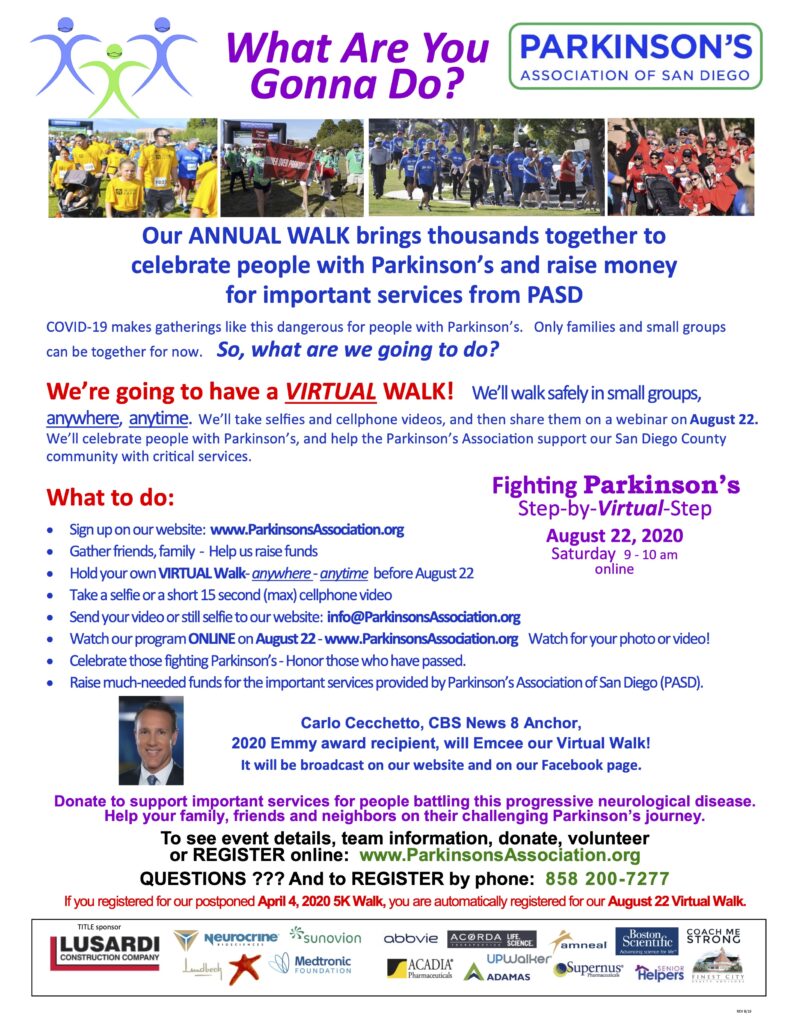PURCHASE THE ONLINE COURSE BELOW:
A Comprehensive Guide For Clinical Social Workers and Psychologists Addressing the Psychological and Social Needs of People with Parkinson’s and Their Families
Developed by the Parkinson’s Association of San Diego Course materials are available as video, audio, and written transcripts.
NOTE – TO TAKE THE COURSE AND ACQUIRE 6 CE UNITS, PLEASE PURCHASE AT THE ZUR INSTITUTE:
https://www.zurinstitute.com/courses/working-with-parkinsons-mental-health-professionals/overview/
Intended Audience: Experienced clinical psychologists and social workers who wish to expand their knowledge of Parkinson’s disease in preparation for working with people with Parkinson’s. This is an intermediate course.
Course Description: A comprehensive program to introduce the clinical psychologist and/or social worker to the medical, psychological, and social intricacies involved with working with people with Parkinson’s. The course includes chapters on motor and non-motor symptoms of Parkinson’s, cognitive decline and other neurological conditions associated with Parkinson’s, guidance on conducting clinician-client sessions with families and those living with Parkinson’s, and current information on causes and treatments of Parkinson’s. A brief quiz follows each chapter (except Chapters 2, 7, and 12). 100 percent passing score is required for course completion. Quiz retakes are available. Following course completion, a Certificate of Completion will be issued.
Outline/Table of Contents:
1 – Introduction – Jeff Seckendorf, Director of Operations, Parkinson’s Association of San Diego
2 – Why I Work with the Parkinson’s Community – Joanne Hamilton, PhD, Neuropsychologist
3 – What is Parkinson’s and What is Not Parkinson’s – Brenton Wright, MD, Movement Disorders Specialist
4 – Known and Suspected Causes of Parkinson’s Disease – Sherrie Gould, NP-C
5 – Common Motor and Non-Motor Symptoms of Parkinson’s Disease – Brenton Wright, MD, Movement Disorders Specialist
6 – Cognition Issues and Advanced Cognitive Decline – Joanne Hamilton, PhD, Neuropsychologist
7 – Why I Work with the Parkinson’s Community – Eric Egli, PhD, Clinical Psychologist
8 – Neurobehavioral Symptoms of Parkinson’s Disease – Joanne Hamilton, PhD, Neuropsychologist
9 – Atypical Parkinsonisms – Sherrie Gould, NP-C
10 – It Takes a Village – Brenton Wright, MD, Movement Disorders Specialist
11 – Parkinson’s Medications and the Family – Sherrie Gould, NP
12 – Why I Work with the Parkinson’s Community – Adriana Gonzalez, LCSW
13 – The Importance of Exercise – Sherrie Gould, NP-C
14 – Financial Challenges of Living with Parkinson’s – Adriana Gonzalez, LCSW
15 – Social and Psychological Resources – Adriana Gonzalez, LCSW
16 – Typical Issues in a Counseling Session – Eric Egli, PhD, Clinical Psychologist
17 – Working with the Family – Eric Egli, PhD, Clinical Psychologist
18 – Conclusion – Jeff Seckendorf, Director of Operations, Parkinson’s Association of San Diego
Educational Objectives: Define and explain Parkinson’s disease and its motor symptoms for the clinical social worker and/or psychologist. Define and explain Parkinson’s disease and its non-motor/cognitive symptoms for the clinical social worker and/or psychologist. Identify and apply some of the intricacies and best practices for clinical social workers and psychologists working with and treating people with Parkinson’s, their families, and their care partners. Identify and apply tools and techniques clinical social workers and psychologists can use when treating people with Parkinson’s, their families, and their care partners.
Sponsored by:
PURCHASE THE ONLINE COURSE HERE (Does not include CE Units):


